150 Best Aristotle Happiness Quotes Unlock Ancient Wisdom for a Joyful Life
Are you chasing fleeting moments of joy or searching for something more profound? Aristotle, the ancient Greek philosopher, believed happiness wasn’t just a feeling, but a way of life.
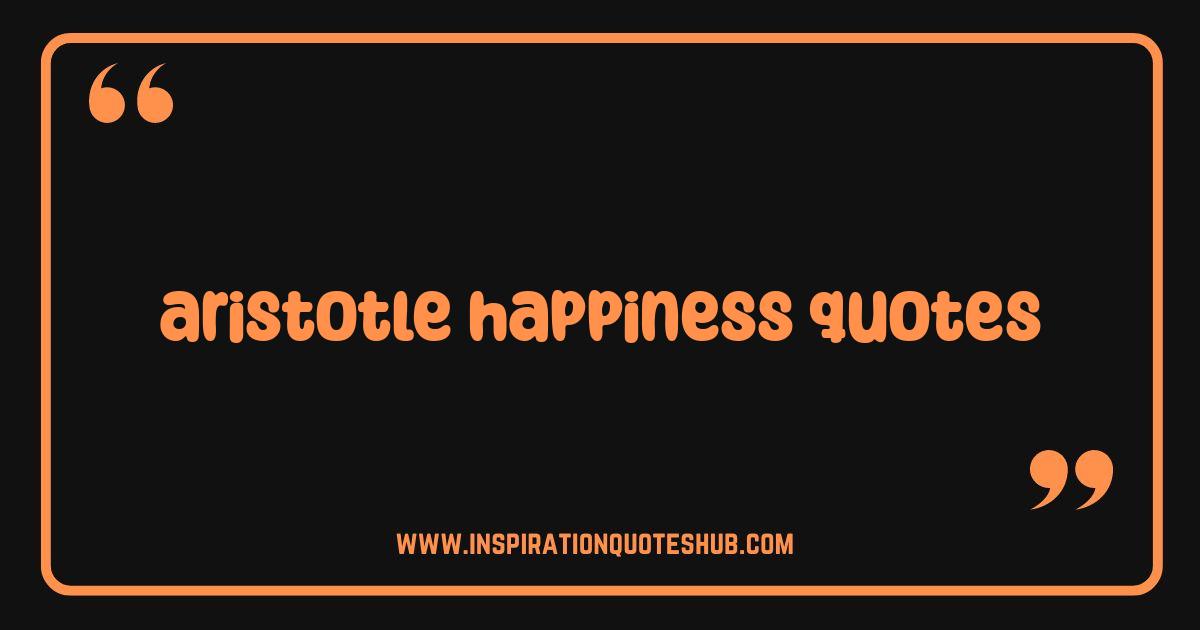
Dive into the wisdom of the ages! This post explores some of the most insightful Aristotle happiness quotes, offering timeless perspectives on how to cultivate a truly fulfilling existence.
Discover how his teachings can guide you toward a life of purpose, virtue, and lasting happiness.
Best Aristotle Happiness Quotes Unlock Ancient Wisdom for a Joyful Life
- Happiness isn’t a destination; it’s the virtuous journey itself.
- True flourishing arises from the consistent practice of moral excellence.
- The pursuit of happiness is the pursuit of purpose, guided by reason.
- Find joy not in fleeting pleasures, but in the enduring satisfaction of a life well-lived.
- Happiness is the ultimate good, achieved through balanced development of mind and character.
- Cultivate virtues, nurture relationships, and engage in meaningful work: these are the cornerstones of a happy existence.
- The secret to happiness is not avoiding pain, but growing through it with resilience and wisdom.
- External circumstances may shift, but inner virtue remains the bedrock of lasting contentment.
- Happiness is the natural consequence of striving for your highest potential, day after day.
- Don’t seek happiness in material possessions, but in the richness of your character and connections.
- The most fulfilling life is one dedicated to both personal growth and the betterment of society.
- Happiness is the harmony achieved when your actions align with your deepest values.
- To be truly happy, understand yourself, and live in accordance with your unique strengths.
- Living a virtuous life is not easy, but the happiness it brings is unmatched.
- Happiness is not a gift bestowed, but a skill developed through conscious effort and unwavering dedication.
Aristotle Happiness Quotes: The Pursuit of Eudaimonia
Aristotle believed happiness wasn’t fleeting pleasure, but a life lived well – “eudaimonia.” His quotes on happiness emphasize virtue, reason, and purpose. It’s not about instant gratification, but cultivating good character and fulfilling your potential. Aristotle’s wisdom invites us to actively pursue a meaningful and flourishing life, finding happiness in…
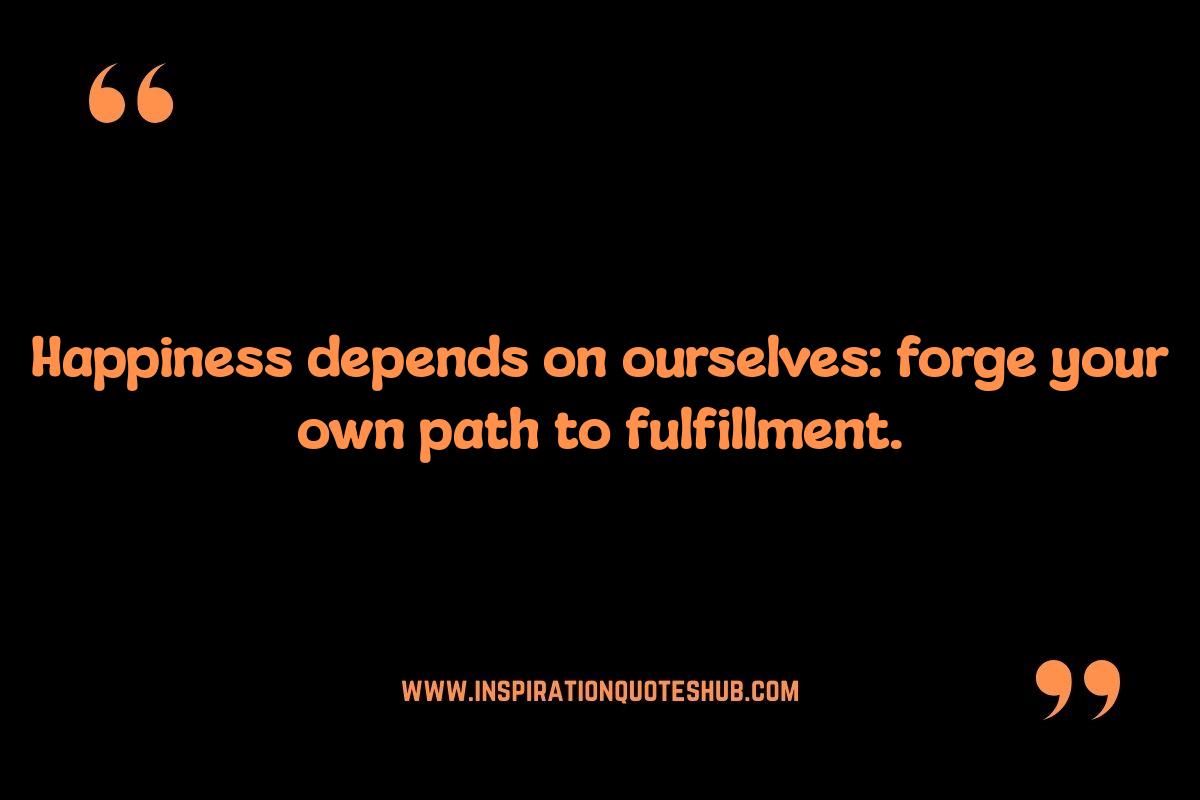
- Happiness depends on ourselves: forge your own path to fulfillment.
- The ultimate value of life depends upon awareness and the power of contemplation rather than upon mere survival: seek understanding.
- Happiness is a state of activity: a continuous pursuit, not a passive reception.
- The happy life is regarded as a life in accordance with virtue; a life, which is indeed a life of effort, but also of happiness: strive for both.
- The function of man is to live a certain kind of life, and this activity implies a rational principle, and the function of a good man is to perform these well and properly: live with purpose.
- Happiness is not amusement: amusement can only be the relaxation, because we cannot be always working: find meaning beyond pleasure.
- Educating the mind without educating the heart is no education at all: cultivate compassion alongside intellect.
- The goal of human existence is happiness: seek eudaimonia through virtuous action.
- We become just by performing just actions, temperate by performing temperate actions, brave by performing brave actions: practice virtue to become virtuous.
- The energy of the mind is the essence of life: nurture your intellect, and you nurture your soul.
- Happiness is a life lived in accordance with virtue and reason: let these guide your path.
- The best way to predict the future is to create it: shape your destiny through virtuous choices.
- The ultimate end of human action is happiness: strive to live a life of purpose and meaning.
- Happiness is not a quality of the moment, but of a lifetime: cultivate virtuous habits for lasting joy.
- Excellence is never an accident. It is always the result of high intention, sincere effort, and intelligent execution; it represents the wise choice of many alternatives – choice, not chance, determines your destiny: choose wisely.
Aristotle Happiness Quotes: Virtue as the Path to Fulfillment
Aristotle believed happiness, or “eudaimonia,” wasn’t fleeting pleasure, but a life well-lived. His famous happiness quotes emphasize virtue. Cultivating virtues like courage and kindness isn’t just about being good; it’s the path to achieving a fulfilling and meaningful existence. For Aristotle, happiness is the natural consequence of living a virtuous…

- Happiness is the ultimate aim, but virtue is the surest arrow to reach it.
- The pursuit of happiness is intertwined with the cultivation of a virtuous character.
- Happiness is not a feeling, but a way of living: a life devoted to virtue.
- To live well and virtuously is the very essence of human flourishing and the key to a life of happiness.
- Virtue is the golden mean: finding balance in all things, the pathway to happiness.
- Happiness lies not in fleeting pleasures, but in the enduring satisfaction of a life lived with purpose and moral excellence.
- We are what we repeatedly do; therefore, excellence and happiness are habits.
- Happiness is the reward that comes from aligning our actions with our highest values.
- The truly happy person finds joy not in circumstance, but in the consistent practice of virtue.
- A life of virtue is a life of happiness, for it is in striving for excellence that we find true fulfillment.
- Happiness is not a destination, but a journey paved with virtuous acts.
- The soul attains happiness through the harmonious development of its intellectual and moral virtues.
- To be happy, cultivate virtue, for it is the foundation upon which a fulfilling life is built.
- Happiness is the natural consequence of a life lived in accordance with reason and virtue.
- The pursuit of virtue is the pursuit of happiness, for a life of moral excellence is a life well-lived.
Aristotle Happiness Quotes: Finding Joy in Meaningful Work
Aristotle believed happiness (eudaimonia) wasn’t fleeting pleasure, but a life well-lived, full of purpose. His quotes emphasize finding joy in virtuous activities and meaningful work. He thought pursuing excellence in what we do, aligning our skills with our values, is key to a truly fulfilling and happy existence. It’s about…
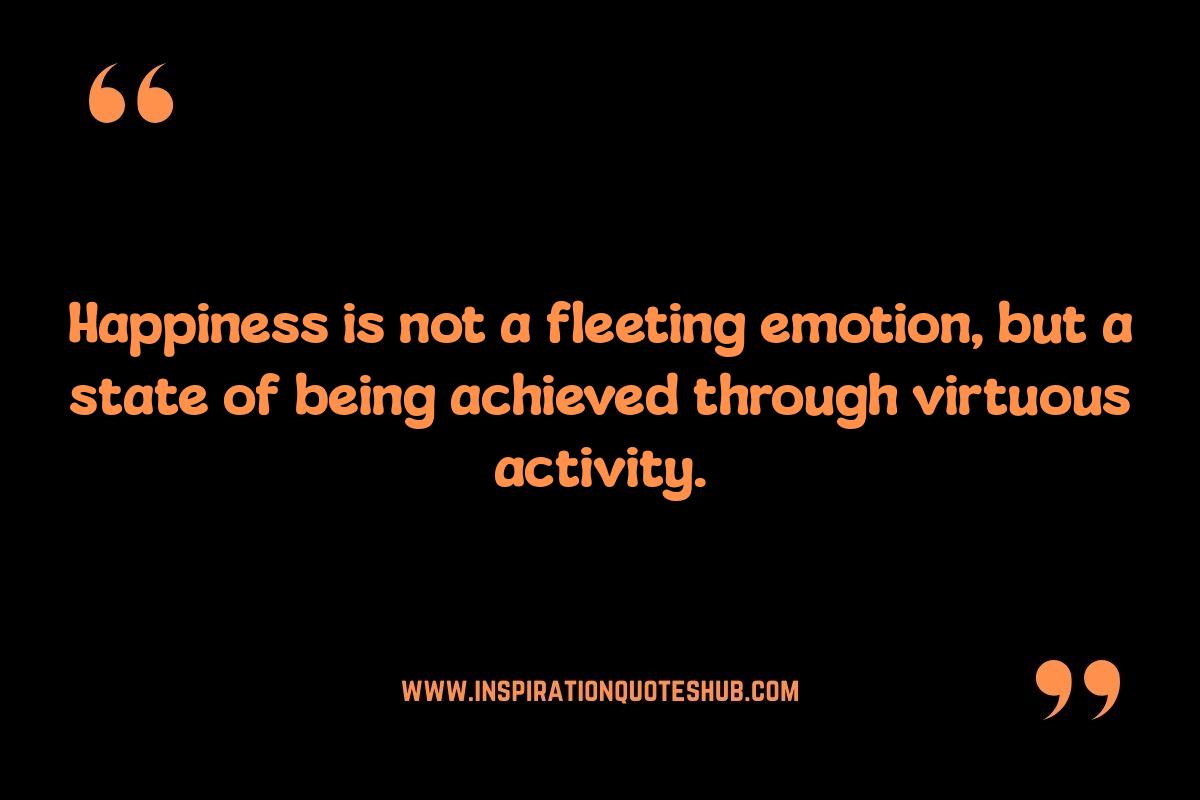
- Happiness is not a fleeting emotion, but a state of being achieved through virtuous activity.
- The ultimate human good is eudaimonia: a life of flourishing, purpose, and moral excellence.
- Find joy in meaningful work, for it is through virtuous action that true happiness is realized.
- Happiness depends on ourselves: cultivate a character worthy of fulfillment.
- The key to happiness lies in aligning your actions with your potential: strive for excellence in all you do.
- Happiness is not found in leisure, but in the vigorous exercise of our faculties in pursuit of virtue.
- Seek happiness through the development of your character: it is the most secure foundation for lasting joy.
- The best life is one lived in accordance with reason and virtue: a balanced harmony of intellect and morality.
- Virtuous actions repeated become habits, and these habits shape a happy life.
- Happiness is not a passive state, but an active pursuit: engage in activities that challenge and fulfill you.
- True happiness is the fruit of a life well-lived: one characterized by purpose, meaning, and moral excellence.
- The path to happiness is paved with virtuous deeds, not fleeting pleasures.
- Happiness is found in the exercise of virtue, not in the attainment of material possessions.
- Find happiness by cultivating your intellectual and moral virtues to live a life of purpose.
- Happiness is the ultimate human aim, achieved by living a life guided by reason and grounded in virtue: strive for both.
Aristotle Happiness Quotes: Wisdom and the Contented Life
Aristotle believed happiness, or *eudaimonia*, wasn’t fleeting pleasure, but a life lived virtuously and purposefully. His quotes offer timeless wisdom on cultivating this “contented life.” Explore his insights on finding happiness through reason, moral character, and fulfilling our potential. Discover how Aristotle’s philosophy can guide you toward a more meaningful…
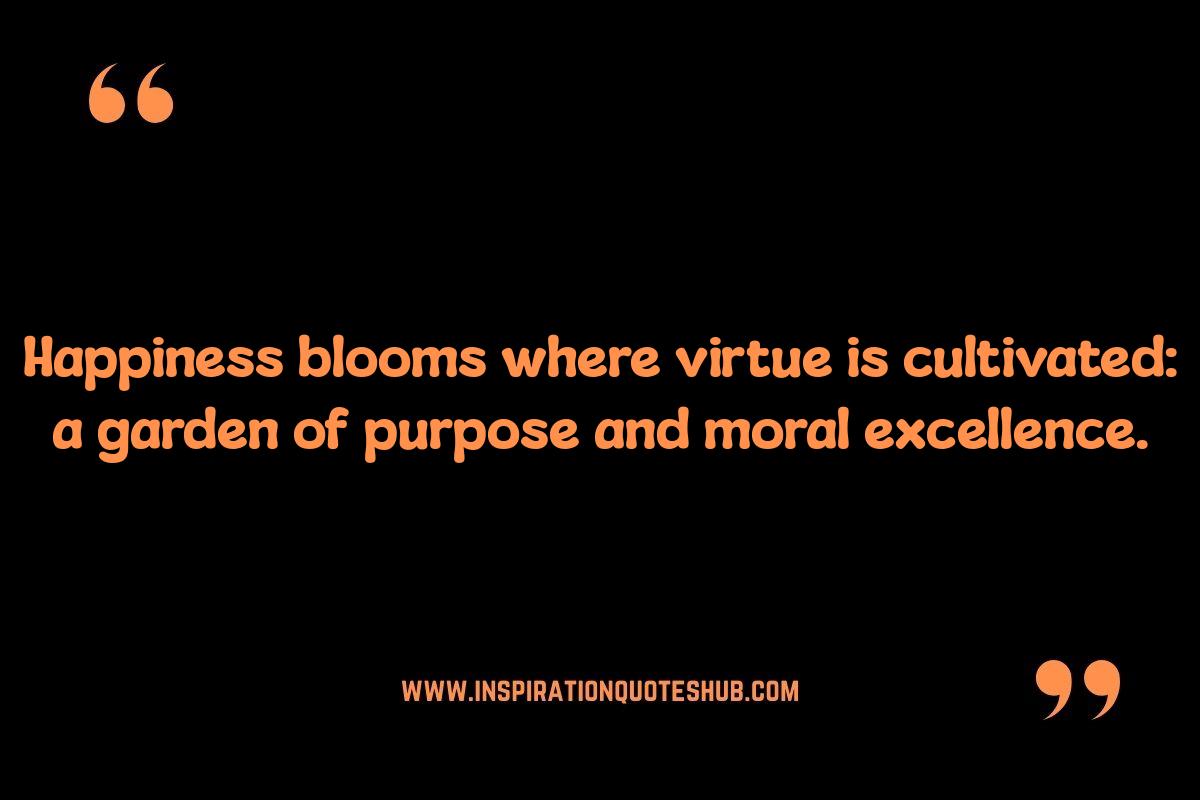
- Happiness blooms where virtue is cultivated: a garden of purpose and moral excellence.
- The path to happiness winds through acts of kindness, justice, and unwavering self-control.
- Happiness is not a stroke of luck, but an active pursuit: engage in activities that challenge and fulfill you.
- Eudaimonia: the ultimate human good, a life of flourishing achieved through virtuous action.
- The truly happy person finds joy not in circumstance, but in the consistent practice of virtue.
- To be truly happy, understand yourself, and live in accordance with your unique strengths.
- Happiness lies not in fleeting pleasures, but in the enduring satisfaction of a life lived with purpose and moral excellence.
- In search of a partner? Look for someone who seeks virtue, not fleeting pleasure.
- Happiness is a state of activity: a continuous pursuit, not a passive reception.
- Seek inner harmony, for happiness stems from a balanced soul.
- True happiness is the fruit of a life well-lived: one characterized by purpose, meaning, and moral excellence.
- Happiness is a state of mind cultivated through virtuous living.
- The goal of human existence is happiness: seek eudaimonia through virtuous action.
- The art of happiness lies in finding contentment with what you have, not in acquiring more.
- Seek happiness through service to others: compassion breeds contentment.
Aristotle Happiness Quotes: The Role of Friendship in Well-being
Aristotle believed happiness, or eudaimonia, wasn’t just a feeling but a flourishing life. He emphasized that genuine happiness is deeply intertwined with meaningful friendships. His quotes highlight how virtuous friends, who inspire and support our growth, are essential for a well-lived and fulfilling existence. Cultivating these relationships is key to…
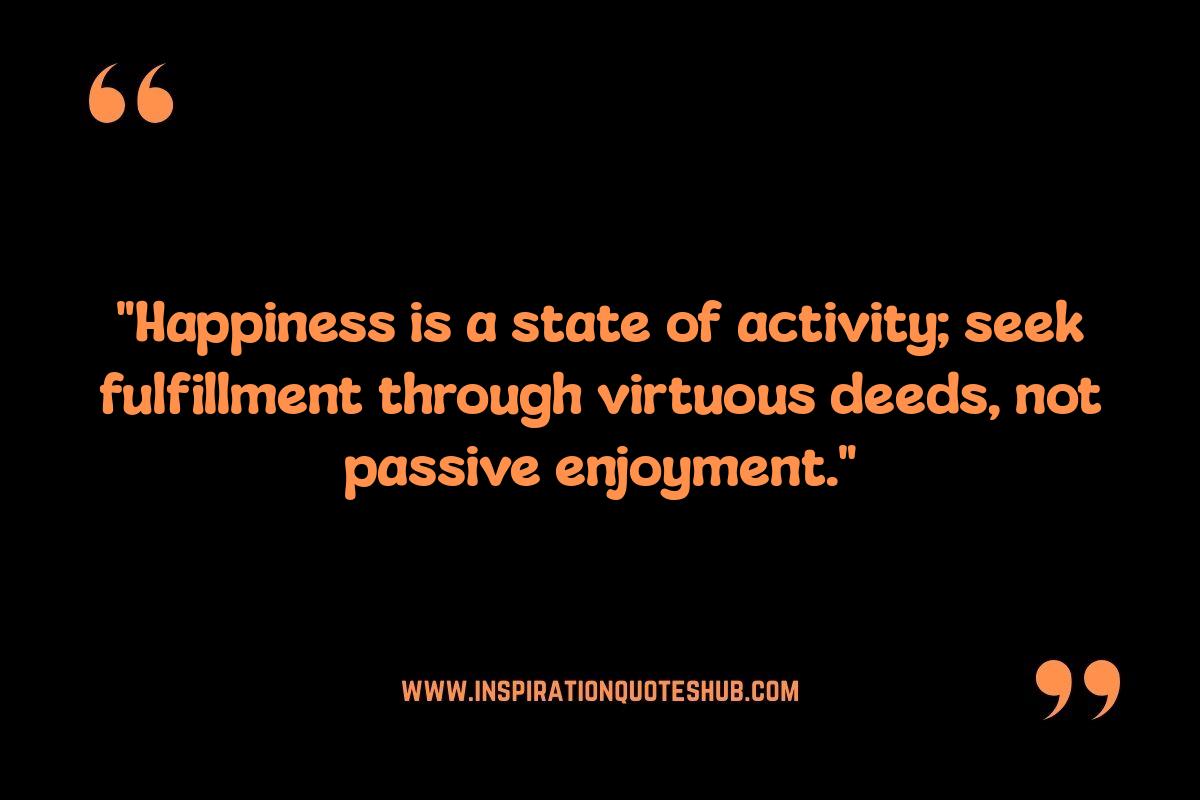
- “Happiness is a state of activity; seek fulfillment through virtuous deeds, not passive enjoyment.”
- “The ultimate end of human life is happiness: strive for excellence in all that you do.”
- “A friend is a second self: choose companions who embody virtue and inspire growth.”
- “True happiness lies not in fleeting pleasures, but in the enduring satisfaction of a life lived with purpose and moral excellence.”
- “The happy life is a life in accordance with virtue; it is a life of effort, but also of happiness.”
- “Friendship is essential for well-being: share your journey with those who uplift and support your pursuit of virtue.”
- “To truly know happiness, understand yourself, and live in accordance with your unique strengths.”
- “The goal of human existence is happiness: seek eudaimonia through virtuous action.”
- “The best mirror is an old friend: they show you who you truly are, challenging you to live virtuously.”
- “Happiness is the natural consequence of a life lived in accordance with reason and virtue: a balanced harmony of intellect and morality.”
- “Seek inner harmony, for happiness stems from a balanced soul, enriched by meaningful connections.”
- “A life without friendship is a solitary existence; seek companions who share your pursuit of virtue.”
- “Happiness is not a passive state, but an active pursuit: engage in activities that challenge and fulfill you alongside trusted friends.”
- “The greatest wealth is to live content with little, surrounded by friends who enrich your life with love and support.”
- “In search of a partner? Look for someone who seeks truth, not fleeting pleasure, someone who will elevate your soul.”
Aristotle Happiness Quotes: Moderation and the Golden Mean
Aristotle believed happiness, or “eudaimonia,” wasn’t fleeting joy, but a life well-lived. His “Golden Mean” emphasizes moderation. Avoid extremes! Courage lies between recklessness and cowardice; generosity between extravagance and stinginess. Finding this balance, tailored to you, cultivates virtue and leads to lasting fulfillment – the true essence of Aristotelian happiness.
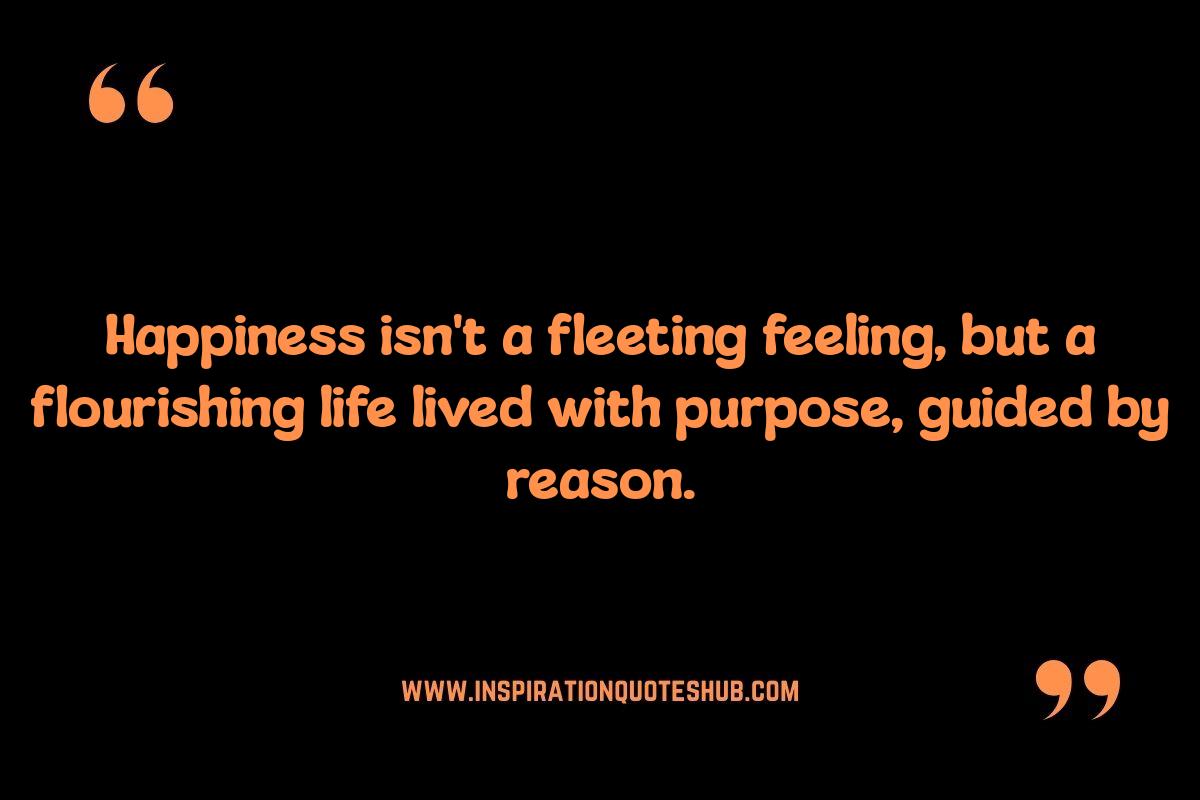
- Happiness isn’t a fleeting feeling, but a flourishing life lived with purpose, guided by reason.
- The path to happiness is paved with virtuous actions, a journey toward moral excellence.
- Cultivate balance in all things; happiness thrives in the golden mean between extremes.
- Happiness is the reward of a life well-lived: a life of purpose, meaning, and moral excellence.
- Aim for eudaimonia: a life of flourishing, purpose, and moral excellence.
- True happiness lies in the consistent practice of virtue, not in the pursuit of fleeting pleasures.
- Moderation isn’t about deprivation, but about finding the sweet spot where joy and fulfillment intersect.
- Happiness is the natural consequence of a life lived in accordance with reason and virtue: a balanced harmony.
- The best life is one lived in accordance with reason and virtue: a balanced harmony of intellect and morality.
- Find happiness by cultivating your intellectual and moral virtues to live a life of purpose.
- Happiness is the ultimate human aim, achieved by living a life guided by reason and grounded in virtue: strive for both.
- The ultimate end of human action is happiness: strive to live a life of purpose and meaning.
- Happiness is the ultimate goal: seek eudaimonia through virtuous action.
- The goal of human existence is happiness: seek eudaimonia through virtuous action.
- To chase virtue without wisdom is to wander aimlessly; to pursue wisdom without virtue is to build on sand, to attain happiness blend both.
Aristotle Happiness Quotes: Cultivating Happiness Through Habit
Aristotle believed happiness, or *eudaimonia*, wasn’t a fleeting feeling but a state cultivated through virtuous habits. His quotes emphasize that consistently practicing qualities like courage, generosity, and justice shapes our character and ultimately leads to a fulfilling life. It’s about becoming a good person, not just feeling good sometimes.
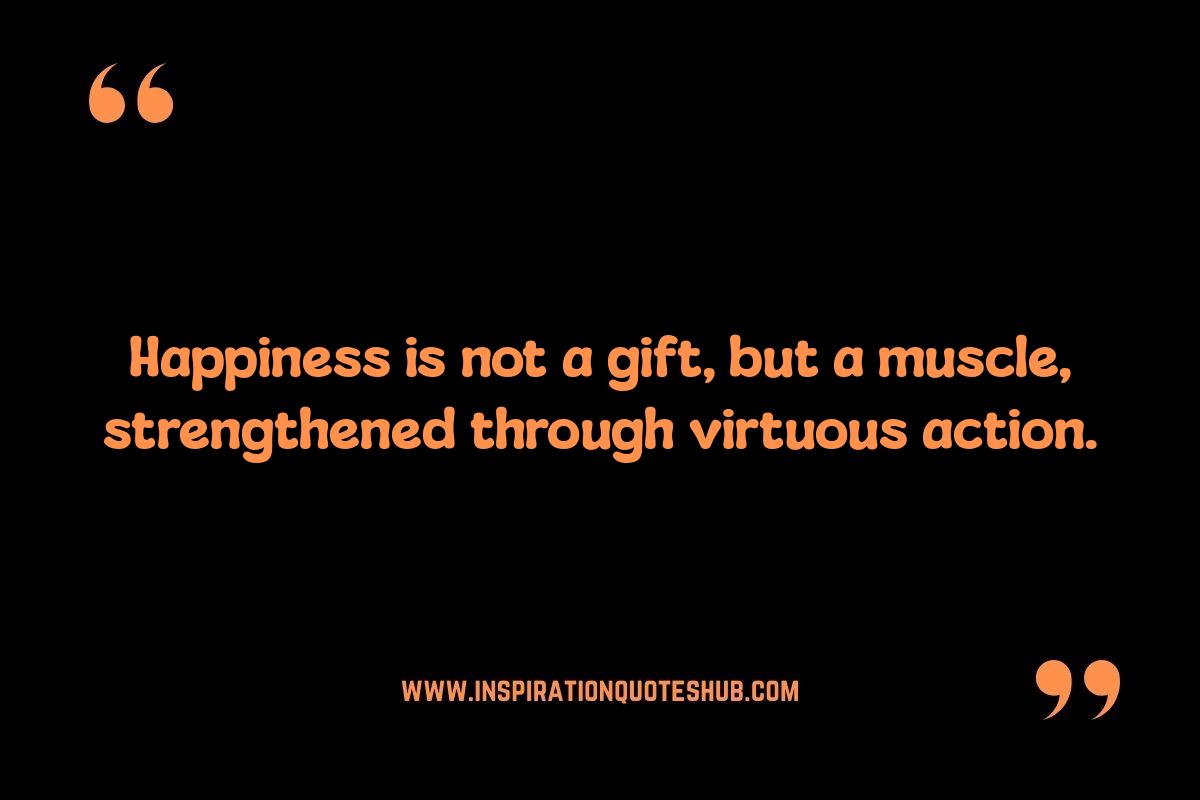
- Happiness is not a gift, but a muscle, strengthened through virtuous action.
- The happy life is a process, not a destination: a daily cultivation of virtue.
- To attain happiness, seek purpose beyond pleasure; let reason guide your actions.
- Cultivate virtuous habits, for they are the seeds of a flourishing life.
- Happiness is the natural consequence of a life lived in accordance with reason and virtue: a balanced harmony of intellect and morality, practiced daily.
- True happiness isn’t a fleeting emotion, but a life well-lived, guided by purpose and virtue.
- The key to lasting happiness is not avoiding challenges, but mastering your response to them through reason.
- Happiness is not found in idleness, but in the purposeful exercise of our faculties.
- Develop virtuous habits, for they lay the foundation for a life of lasting happiness.
- Happiness is not the absence of problems, but the ability to overcome them with virtue and resilience.
- Seek happiness not in possessions, but in the consistent practice of moral excellence.
- Cultivate virtue, and happiness will naturally blossom as the fruit of your efforts.
- Happiness is the ultimate human aim, achieved by living a life guided by reason and grounded in virtue: strive for both.
- True happiness is not a destination, but a continuous journey of virtuous action and self-improvement.
- Seek happiness through the harmonious development of your intellectual and moral virtues.
Aristotle Happiness Quotes: Happiness vs. Pleasure: Aristotle’s Distinction
Aristotle wasn’t about fleeting pleasures. He believed true happiness, or “eudaimonia,” comes from living a virtuous life and fulfilling your potential. It’s not just feeling good momentarily, like indulging in a treat. Think deeper satisfaction, achieved through meaningful action and developing your character – that’s Aristotle’s happiness.
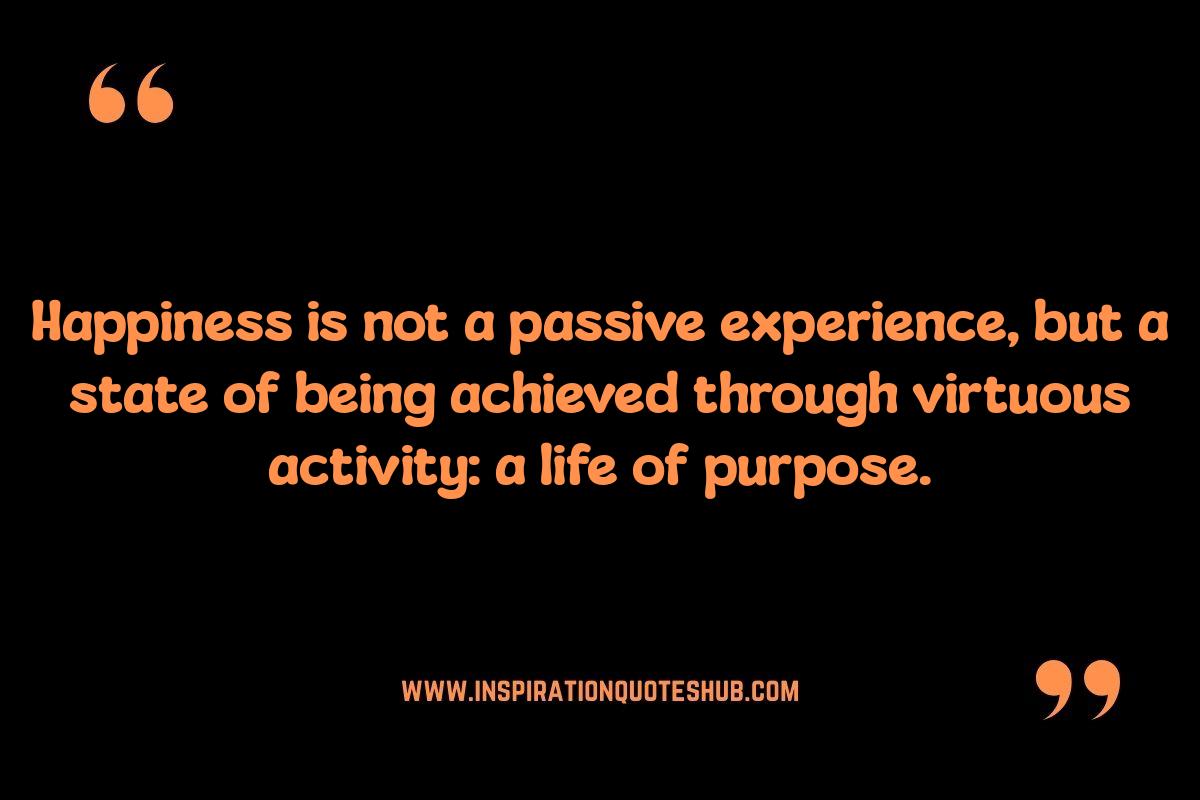
- Happiness is not a passive experience, but a state of being achieved through virtuous activity: a life of purpose.
- True happiness is found not in fleeting pleasures, but in the enduring satisfaction of contributing to something larger than oneself.
- The pursuit of happiness is inseparable from the pursuit of virtue: excellence in action is the key.
- Pleasure is ephemeral; happiness is enduring: cultivate a life of meaning over momentary gratification.
- Happiness is not the fulfillment of every desire, but the skillful management of desires through reason and moderation.
- Seek eudaimonia: a life of flourishing, where actions align with your potential, guided by reason and virtue.
- Pleasure is a sensation; happiness is a state of being: cultivate inner harmony, not external stimulation.
- Happiness is not a destination, but a journey: a consistent practice of virtuous living, not a passive reception of joy.
- The pursuit of happiness is the pursuit of purpose, guided by reason and tempered by virtue.
- True happiness is self-sufficient, not dependent on external validation or fleeting pleasures.
- Pleasure distracts from virtue; happiness springs from it: choose wisely where you invest your energy.
- Happiness is the natural consequence of a life lived in accordance with reason and virtue: a balanced harmony of intellect and morality, practiced daily.
- Seek happiness through the harmonious development of your intellectual and moral virtues, not through fleeting material pursuits.
- Happiness is not a feeling, but a way of living: a life devoted to virtue, reason, and the pursuit of excellence.
- The happy life is a process, not a destination: a daily cultivation of virtue that leads to a flourishing existence.






